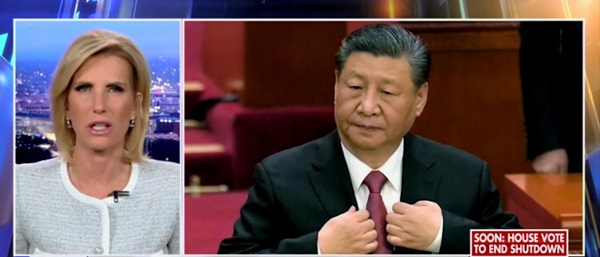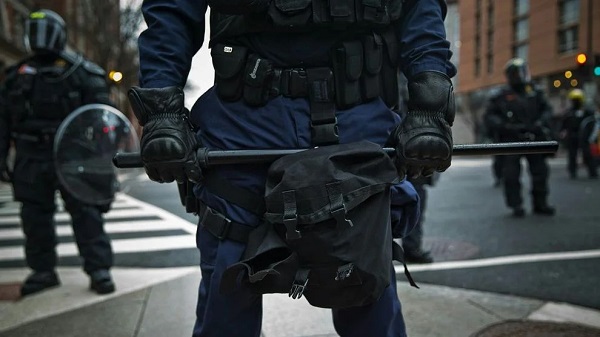espionage
North Americans are becoming numb to surveillance.

Eliminating Quiet Skies is hopefully just a start. The government spent $200 million a year following up to 50 people a day for a program that in its history never once led to an arrest, or thwarted a single criminal act.
Last year, former Hawaii Congresswoman and Presidential Candidate Tulsi Gabbard was placed in a surveillance program called Quiet Skies by the Transportation and Security Administration. Across eight flights she was subject to intrusive searches, followed by bomb-sniffing dogs, and trailed by three Federal Air Marshals per flight, who if they were following procedure were attempting to listen to her conversations, following her to airport exits to see who if anyone met her, and even recording how often and at what times she went to the bathroom.
To cover the story I contacted the TSA. They no-commented the main question – “TSA does not confirm or deny whether any individual has matched to a risk-based rule,” they said – but they added, as if in mitigation: ”Simply matching to a risk-based rule does not constitute derogatory information about an individual.”
In other words: “We can’t say if Ms. Gabbard was in the program, but if she was, don’t draw conclusions, because we do this even to innocent people.”
Before Quiet Skies was discontinued by this administration, it was a symbol of the steep decline of federal enforcement since 9/11. The government spent $200 million a year following up to 50 people a day for a program that in its history never once led to an arrest, or thwarted a single criminal act. Despite its demonstrated inutility and grave civil liberties concerns it was re-funded year after year because this is what our government does now: it gathers information on its own citizens as an end in itself.
In a week in which the question of whether federal security officials always tell the truth to Congress is back in the news, it’s worth noting that it’s been 13 years since then-National Intelligence Director James Clapper answered, “No, sir,” and “Not wittingly” when Senator Ron Wyden of Oregon asked, “Does the NSA collect any type of data at all on millions, or hundreds of millions of Americans?”
Clapper later explained that he’d responded in the “least most untruthful manner.”
That episode solidified the principle that if you lie about mass surveillance programs in America, even under oath, you not only get to keep your job, you get to be hired as a professional truth-teller after retirement, a National Security Analyst for CNN. If you try to tell the truth about the same issues, your options are prison or leaving the country forever.
In those 13 years since, Americans became numb to surveillance. It was once a core principle that government couldn’t or shouldn’t spy on citizens without predication. Now much of the country accepts as inevitable the idea that every move we make is being recorded and analyzed.
We know emails and phone conversations are being collected passively, via programs of dubious legality, and the mountains of data we leave behind as our lives move online– from geolocations of cell phones to GPS tracking to travel, banking, and medical records – are increasingly fodder for overt and covert acquisition by federal analysts. As Google admitted last week, federal officials partnered with companies not just to monitor speech but to suppress it on a grand scale.
A lot of these changes have their roots in War on Terror programs that exchanged predication for a pre-crime theory out of Minority Report. Quiet Skies was the paradigmatic example of a program that could take endless liberties with the Constitution because it was secret. When you gather information with no intention of going to court, as the TSA did with Quiet Skies, you never have to justify yourself to a judge. This leads to a lot of what one court called “the exact sort of ‘general, exploratory rummaging’ that the Fourth Amendment was designed to prevent.”
This is a betrayal not just of the public but of people we trained at taxpayer expense to do real and important work. Former Marshal Robert MacLean put it best when he said “The air marshal’s job is to protect the cockpit and the pilots. Let somebody else do the intelligence.”
Similarly in the last decade current and former FBI agents – fellow witness Tristan Leavitt’s firm has represented a number of them – have talked about how since 9/11, the FBI spends less time building cases but does more generalized spying, much of it political. One agent I interviewed said “The distinction between people who believe bad thoughts and people who do bad things” has been “completely lost” on our government since 9/11.
Once you start down the road of collecting information on innocent people, it creates the intellectual justification for doing it again and again. From a contracting perspective, this is the proverbial self-licking ice cream cone, a spiral of endless expense. Morally, all this information-gathering reverses the natural political order, giving elected officials undeserved and unearned power over their bosses – the voters. These programs all need to be reevaluated. A lot of them have to go. People who lie about them in this chamber need to be fired.
Let’s hope the elimination of Quiet Skies is just the beginning. Thank you.
Business
P.E.I. Moves to Open IRAC Files, Forcing Land Regulator to Publish Reports After The Bureau’s Investigation

Following an exclusive report from The Bureau detailing transparency concerns at Prince Edward Island’s land regulator — and a migration of lawyers from firms that represented the Buddhist land-owning entities the regulator had already probed — the P.E.I. Legislature has passed a new law forcing the Island Regulatory and Appeals Commission (IRAC) to make its land-investigation reports public.
The bill — introduced by Green Party Leader Matt MacFarlane — passed unanimously on Wednesday, CTV News reported. It amends the Lands Protection Act to require IRAC to table final investigation reports and supporting documents in the Legislature within 15 days of completion.
MacFarlane told CTV the reform was necessary because “public trust … is at an all-time low in the system,” adding that “if Islanders can see that work is getting done, that the (LPA) is being properly administered and enforced, that will get some trust rebuilt in this body.”
The Bureau’s report last week underscored that concern, showing how lawyers from Cox & Palmer — the firm representing the Buddhist landholders — steadily moved into senior IRAC positions after the regulator quietly shut down its mandated probe into those same entities. The issue exploded this fall when a Legislative Committee subpoena confirmed that IRAC’s oft-cited 2016–2018 investigation had never produced a final report at all.
There have been reports, including from CBC, that the Buddhist landholders have ties to a Chinese Communist Party entity, which leaders from the group deny.
In the years following IRAC’s cancelled probe into the Buddhist landholders, The Bureau reported, Cox & Palmer’s general counsel and director of land joined IRAC, and the migration of senior former lawyers culminated this spring, with former premier Dennis King appointing his own chief of staff, longtime Cox & Palmer partner Pam Williams, as IRAC chair shortly after the province’s land minister ordered the regulator to reopen a probe into Buddhist landholdings.
The law firm did not respond to questions, while IRAC said it has strong measures in place to guard against any conflicted decision-making.
Reporting on the overall matter, The Bureau wrote that:
“The integrity of the institution has, in effect, become a test of public confidence — or increasingly, of public disbelief. When Minister of Housing, Land and Communities Steven Myers ordered IRAC in February 2025 to release the 2016–2018 report and reopen the investigation, the commission did not comply … Myers later resigned in October 2025. Days afterward, the Legislative Committee on Natural Resources subpoenaed IRAC to produce the report. The commission replied that no formal report had ever been prepared.”
The Bureau’s investigation also showed that the Buddhist entities under review control assets exceeding $480 million, and there is also a planned $185-million campus development in the Town of Three Rivers, citing concerns that such financial power, combined with a revolving door between key law firms, political offices and the regulator, risks undermining confidence in P.E.I.’s land-oversight regime.
Wednesday’s new law converts the expectation for transparency at IRAC, voiced loudly by numerous citizens in this small province of about 170,000, into a statutory obligation.
Housing, Land and Communities Minister Cory Deagle told CTV the government supported the bill: “We do have concerns about some aspects of it, but the main principles of what you’re trying to achieve are a good thing.”
The Bureau is a reader-supported publication.
To receive new posts and support my work, consider becoming a free or paid subscriber.
Daily Caller
Laura Ingraham’s Viral Clash With Trump Prompts Her To Tell Real Reasons China Sends Students To US


From the Daily Caller News Foundation
On Monday, Ingraham pressed Trump on why a plan to admit 600,000 Chinese nationals into U.S. universities qualifies as a “pro-MAGA” move, challenging him directly after he defended the influx as vital to maintaining Washington’s relationship with Beijing. During a Wednesday broadcast, Ingraham said no modern president has fought harder for American workers than Trump and predicted he will “honor that distinction for the next three years.”
“There was also more consternation over the approach to allowing Chinese and other foreign students to take spots at U.S. universities. A lot of MAGA folks didn’t like that at all. And it’s not, by the way, as some Chinese influencers today said on X, I love this, it’s not that the MAGA folks, certainly not myself, dislike the Chinese people. It’s ridiculous,” Ingraham said.
“What they dislike is the Chinese system that represses Chinese people and uses them as human spies and saboteurs. Remember, when the CCP greenlights hundreds of thousands of their people to come study here, they’re not sending them so they can learn about the wonders of Western civilization, Plato and Socrates, Greek history, become champions of individual freedom and take that message back home. They’re sent here to do whatever is necessary to learn how to push the People’s Republic closer to crushing America, to stealing from us, and for spying on us,” Ingraham added.
Ingraham said that people “understandably perplexed by some of the president’s comments, we cannot forget, what American president has ever been tougher on China than Donald Trump? None.”
Ingraham told viewers that Beijing does not send its students to America to study the Western canon or return home as advocates of individual liberty.
WATCH:
Ingraham warned that China’s rise didn’t happen overnight, saying that decades of inattentive presidents allowed Beijing to gain the strength Trump now must confront.
“Given China’s growing strength that’s been amassed over decades of presidents who were out to lunch, President Trump inherited the most challenging situation,” Ingraham said. “I don’t think it’s an exaggeration to say this, that any president has faced in the last 50 years. He and his entire team are dedicated to countering the Chinese aggression that’s building.”
Washington and Beijing struck a deal in June clearing the way for Chinese nationals to enroll in American universities, a shift that followed the administration’s June 5 move blocking Harvard from bringing in additional international students. Officials justified the restriction by pointing to security vulnerabilities and rising campus turmoil, including allegations of antisemitic activity, as reasons to tighten the flow of foreign applicants.
Trump acknowledged at the time that admitting large numbers of students from a country controlled by the Chinese Communist Party carries real intelligence concerns, saying in June that the government “must be vigilant” about who enters U.S. classrooms. National security experts told the Daily Caller News Foundation that the policy could create openings for the CCP to exploit America’s higher-education system and potentially endanger U.S. interests.
-

 International2 days ago
International2 days agoUS announces Operation Southern Spear, targeting narco-terrorists
-

 Bruce Dowbiggin2 days ago
Bruce Dowbiggin2 days agoDEI Or Die: Out With Remembrance, In With Replacement
-

 Addictions1 day ago
Addictions1 day agoCanadian gov’t not stopping drug injection sites from being set up near schools, daycares
-

 International2 days ago
International2 days agoIs America drifting toward civil war? Joe Rogan thinks so
-

 Business1 day ago
Business1 day agoParliamentary Budget Officer begs Carney to cut back on spending
-

 International2 days ago
International2 days agoBondi and Patel deliver explosive “Clinton Corruption Files” to Congress
-

 International2 days ago
International2 days agoState Department designates European Antifa groups foreign terror organizations
-

 Censorship Industrial Complex2 days ago
Censorship Industrial Complex2 days agoEU’s “Democracy Shield” Centralizes Control Over Online Speech












